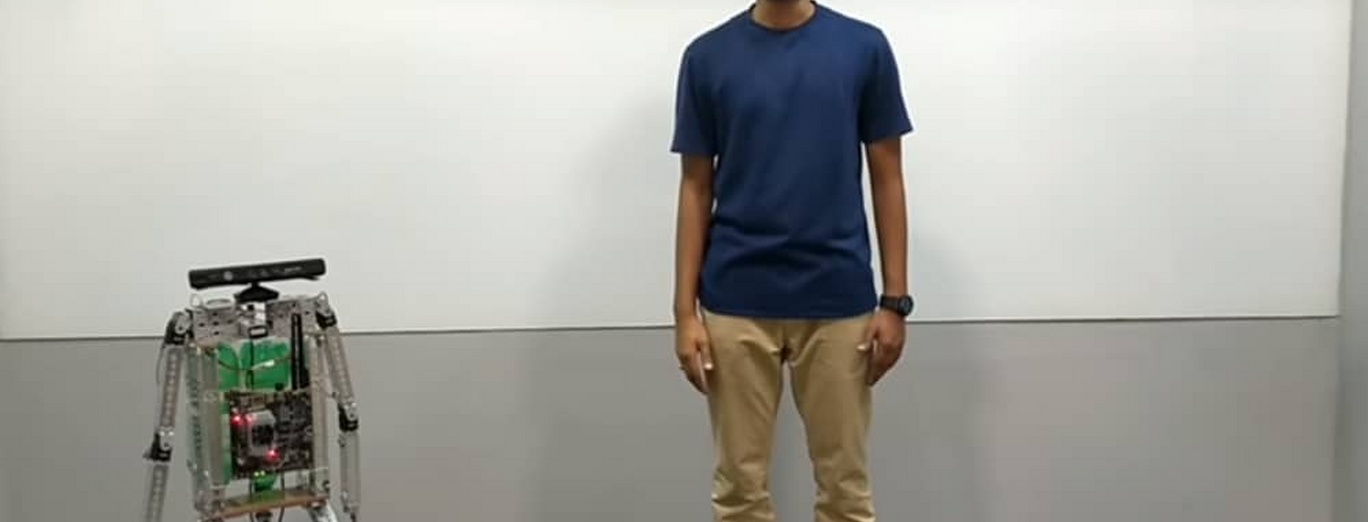Inside the mind of the creator of a life-saving robot


photo: Amit Kharwandikar with AVITRA - Reconnaissance Robot
Recently we’ve had a chance to ask Amit Kharwandikar a few questions. Aged 21 he was a participant of the NVIDIA Jetson™ Developer Challenge who was responsible for building and development of AVITRA - Reconnaissance Robot which received the Public Choice Award. It was undoubtedly one of the most interesting projects submitted to the challenge and so we couldn’t be happier to get more insight into how its creator went about preparation to and participation in the challenge.
Amit, tell us, are you a student? Or are you employed?
I and my team are undergraduate students studying Electrical Engineering at Veermata Jijabai Technological Institute, Mumbai, India.
How did you come up with the idea for your project? What’s your story?
Our motivation was to develop an unmanned robotic system that would be used to explore disaster affected places inaccessible for humans. We were motivated by Japan’s quest to use robots for cleaning up nuclear debris of the Fukushima Daiichi nuclear plant. We aspired to build a robotic platform that is more versatile and can be used in a variety of disaster- mitigation operations. We believed that a humanoid architecture would be ideal to navigate in a human-optimised environment. And that’s how ‘AVITRA - Reconnaissance Robot’ was conceived.
Why did you decide to take part in the NVIDIA Challenge?
When we first heard about the challenge, we were attracted by its global exposure and the chance to work on the Jetson GPU. We had heard about its computational capabilities and found the challenge as a perfect opportunity to test it out.
This tells us you didn’t have much experience with Jetson platform before. Have you built any system with AI prior to the challenge?
We are relatively new to AI, having started learning about it only a few months ago. This was our first AI project.
How long did it take you to complete the works on the projects?
We started working on the project from November. It took us a while to finish with the mechanical structure and the electronic circuitry before laying our hands on the Jetson-right from unboxing to setting up the entire system. In the process we learnt a lot about the various AI techniques and how we can implement them in our project.
Was there anything else significant that you’ve learned?
Being new to AI, we started with the basics and slowly moved on to the relevant concepts. We also learned about the various principles and techniques used in robotics, and how robotics and AI together make an intelligent system. Our biggest takeaway from the project would be running the entire system in ROS framework.
What did you find the most difficult, and the easiest part of the competition?
The toughest part for us was to come up with a unique idea that would be intellectually fulfilling. Working all the subsystems together was made quite easy by the superior computing prowess of the Jetson TX-2 that we used.
Was there some particularly valuable skill that you’ve gained?
Over the course of the contest we came across quite some challenges. One of them was to come up with a generalised method of control that requires minimal adjustments according to the situation. After some research, we came up with an imitation based control that is independent of the controller and the situation. We had to develop a mathematical model of a humanoid arm and apply inverse kinematics and quaternions to derive the joint angles for the robot to mimic the controller.
Now let’s put your project aside for next few questions. Do you like the idea of hackathons?
We do like the idea of a hackathon, owing to the fact that it evokes pragmatic, innovative ideas and solutions in limited amount of time.
Do you take part in such events often?
We have participated in a range of hackathons, usually spanning over a couple of days. Hackathons provide a platform to showcase our ideas and do so in a competitive environment.
So any plans for more hackathons to conquer in the future?
We would surely love to participate in hackathons which hold themes relevant to our projects and interests.
Would you say that participation in such contests may help you in the future?
Taking part in hackathons has been and will continue to help us in learning and innovating.
If you had to pick one, what would be the biggest takeaway from the hackathon?
We became aware of various AI based projects in different corners of the world and were baffled by the range of applications. Also, we were motivated to complete our project within the given frame of time.
Lastly, no question. Now is the time for a short statement from you.
We would like to convey our best wishes to the winners and other participants for their commendable work.
If you would like to participate in a similar hackathon visit our website with list of hackathons and challenges. Pick an event that suits your interests. See you soon?